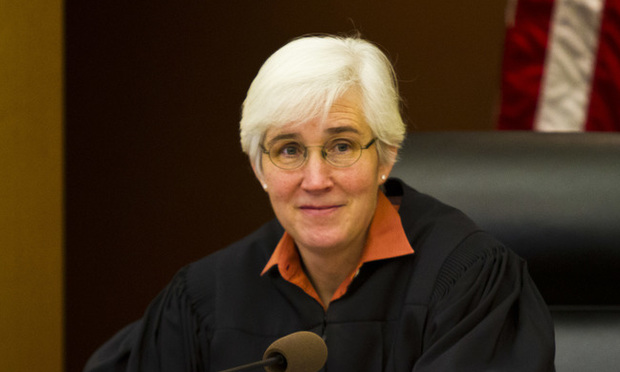Judge Nixes Request to Dump J&J Talc Trial After Plaintiffs Wrap Up Case
Lawyers for Johnson & Johnson said the plaintiffs had failed to prove their claims that baby powder caused the cancer that killed a woman in 2016.
September 25, 2019 at 05:14 PM
5 minute read
 Judge Jane Morrison, Fulton County State Court, Atlanta. (Photo: John Disney/ ALM)
Judge Jane Morrison, Fulton County State Court, Atlanta. (Photo: John Disney/ ALM)
The Fulton County judge overseeing a trial in which Johnson & Johnson is accused of marketing talc-based baby powder that caused a woman's ovarian cancer declined to stop the trial and clear the company of liability after the plaintiffs wrapped up their case.
In a motion for a directed verdict, Johnson & Johnson said the attorneys for the deceased woman's granddaughter and executor had failed to prove the baby powder was linked to ovarian cancer in general or that it caused the death of Diane Brower.
They also said there was no evidence Johnson & Johnson had any reason to warn people that they may be at risk of cancer by using the product.
The call for Johnson & Johnson to be cleared of liability came more than two weeks into the trial before Judge Jane Morrison. The litigation centers on claims that Brower used the company's baby powder for decades before being diagnosed with Stage 3 ovarian cancer a few years before her death in 2016.
Lead plaintiffs attorney R. Allen Smith of The Smith Firm in Ridgeland, Mississippi, and his team have presented expert testimony from three physicians to support their thesis that Brower's use of the powder led to her cancer. Smith is working alongside Ted Meadows of Beasley, Allen, Crow, Methvin Portis & Miles in Montgomery, Alabama, and Sharon Zinns and Robert Register in the firm's Atlanta office.
The defense team, led by James Smith of Blank Rome in Philadelphia, includes Debra Pole and Eric Schwartz of Sidley Austin in Los Angeles; Z. Ileana Martinez and Leslie Suson of Thompson Hine in Atlanta; and Mark Hegerty of Shook Hardy & Bacon in Kansas City, Missouri.
Their motion said none of the experts presented evidence of either general or specific causation. They argued that only one was qualified to make such a judgment, and he only decided talc was linked to ovarian cancer after being hired to do so.
"At trial, plaintiffs offered three scientific experts," the motion said, whom "the plaintiffs may contend support a finding of causation. None of them do."
One doctor, gynecologist-oncologist James Barter of Rockville, Maryland, "conceded that his general causation opinion that perineal application of baby powder can cause ovarian cancer is not generally accepted by the scientific community" and "thus, by his own admission, is unreliable," the motion argued.
In fact, the motion said, in some of the studies Barter referenced, "increased dosage of talc actually decreased risk of ovarian cancer."
That fact that Barter continued to argue that talc can cause ovarian cancer "despite evidence indicating the opposite to be true, illustrates his 'results only' approach to providing helpful testimony for plaintiffs at all costs."
"Indeed, Dr. Barter conceded that he formed an opinion that talcum powder caused ovarian cancer only after he was hired and paid as an expert witness in this case, and prior to this, during his entire career of 42 years, he never held such an opinion, and never told a patient who had been diagnosed with ovarian cancer that it had been caused by her use of talcum powder," the motion said.
Another expert, John Godleski of Brigham and Women's Hospital in Boston, is a pulmonary pathologist.
"Dr. Godleski is unqualified," the defense filing said, and "conceded both that he is not an oncologist or gynecologist and that he is not an expert in the field of ovarian cancer or its cause.
"Rather," it continued, "he admitted that his testimony was being offered only related to the alleged presence of talc in Ms. Brower's pathology tissue."
Godleski himself said he was not expressing any causation opinion and acknowledged that there has been no conclusive proof that talc applied to the genital area can enter the vagina, it said.
The third witness, pharmacologist and toxicologist Laura Plunkett, was called to testify about Johnson & Johnson's duty to warn, it said, and "specifically testified that she is not a causation expert and thus, by her own admission, none of her opinions may be considered on the issue of general or specific causation."
As to that duty, the defense argued, it was only in 1982 that a key study linked the use of perineal talc to ovarian cancer. Brower stopped using the powder in 1980, so Johnson & Johnson had no duty to warn her, it said.
The plaintiffs' reply said Plunkett's testimony demonstrated that talc was known to be toxic to human tissue as far back as the 1930s and had been linked to cancer of the female organs since the 1960s.
Both Godleski and Barter presented evidence that talc was the proximate cause of Brower's cancer, it said.
Godleski testified that talc particles were found in her tissues and cited studies showing that talc could migrate from the vaginal area to the pelvic organs.
Barter testified that studies showed Johnson & Johnson Baby Powder caused ovarian cancer, and that Brower's use of it was a contributing cause of her cancer.
On Tuesday, Morrison declined to grant the defense motion, and J&J began presenting their case, with testimony likely to last at least until Friday.
The litigation is one of more than an estimated 14,600 cases filed around the country claiming that Johnson & Johnson continued marketing its talc-containing products without warning women they could lead to an increased risk for ovarian cancer.
This content has been archived. It is available through our partners, LexisNexis® and Bloomberg Law.
To view this content, please continue to their sites.
Not a Lexis Subscriber?
Subscribe Now
Not a Bloomberg Law Subscriber?
Subscribe Now
NOT FOR REPRINT
© 2025 ALM Global, LLC, All Rights Reserved. Request academic re-use from www.copyright.com. All other uses, submit a request to [email protected]. For more information visit Asset & Logo Licensing.
You Might Like
View All

Upcoming Changes to Medicare Secondary Payer Reporting: What WC Insurers and Attorneys Need to Know
5 minute read
Biden Administration Tells Justices That Bans on Gender Care Are Sex Discrimination

11th Circuit Allows Florida Transgender Health Care Ban to Continue Pending Full Appeal on Constitutionality of Law
Trending Stories
Who Got The Work
J. Brugh Lower of Gibbons has entered an appearance for industrial equipment supplier Devco Corporation in a pending trademark infringement lawsuit. The suit, accusing the defendant of selling knock-off Graco products, was filed Dec. 18 in New Jersey District Court by Rivkin Radler on behalf of Graco Inc. and Graco Minnesota. The case, assigned to U.S. District Judge Zahid N. Quraishi, is 3:24-cv-11294, Graco Inc. et al v. Devco Corporation.
Who Got The Work
Rebecca Maller-Stein and Kent A. Yalowitz of Arnold & Porter Kaye Scholer have entered their appearances for Hanaco Venture Capital and its executives, Lior Prosor and David Frankel, in a pending securities lawsuit. The action, filed on Dec. 24 in New York Southern District Court by Zell, Aron & Co. on behalf of Goldeneye Advisors, accuses the defendants of negligently and fraudulently managing the plaintiff's $1 million investment. The case, assigned to U.S. District Judge Vernon S. Broderick, is 1:24-cv-09918, Goldeneye Advisors, LLC v. Hanaco Venture Capital, Ltd. et al.
Who Got The Work
Attorneys from A&O Shearman has stepped in as defense counsel for Toronto-Dominion Bank and other defendants in a pending securities class action. The suit, filed Dec. 11 in New York Southern District Court by Bleichmar Fonti & Auld, accuses the defendants of concealing the bank's 'pervasive' deficiencies in regards to its compliance with the Bank Secrecy Act and the quality of its anti-money laundering controls. The case, assigned to U.S. District Judge Arun Subramanian, is 1:24-cv-09445, Gonzalez v. The Toronto-Dominion Bank et al.
Who Got The Work
Crown Castle International, a Pennsylvania company providing shared communications infrastructure, has turned to Luke D. Wolf of Gordon Rees Scully Mansukhani to fend off a pending breach-of-contract lawsuit. The court action, filed Nov. 25 in Michigan Eastern District Court by Hooper Hathaway PC on behalf of The Town Residences LLC, accuses Crown Castle of failing to transfer approximately $30,000 in utility payments from T-Mobile in breach of a roof-top lease and assignment agreement. The case, assigned to U.S. District Judge Susan K. Declercq, is 2:24-cv-13131, The Town Residences LLC v. T-Mobile US, Inc. et al.
Who Got The Work
Wilfred P. Coronato and Daniel M. Schwartz of McCarter & English have stepped in as defense counsel to Electrolux Home Products Inc. in a pending product liability lawsuit. The court action, filed Nov. 26 in New York Eastern District Court by Poulos Lopiccolo PC and Nagel Rice LLP on behalf of David Stern, alleges that the defendant's refrigerators’ drawers and shelving repeatedly break and fall apart within months after purchase. The case, assigned to U.S. District Judge Joan M. Azrack, is 2:24-cv-08204, Stern v. Electrolux Home Products, Inc.
Featured Firms
Law Offices of Gary Martin Hays & Associates, P.C.
(470) 294-1674
Law Offices of Mark E. Salomone
(857) 444-6468
Smith & Hassler
(713) 739-1250






